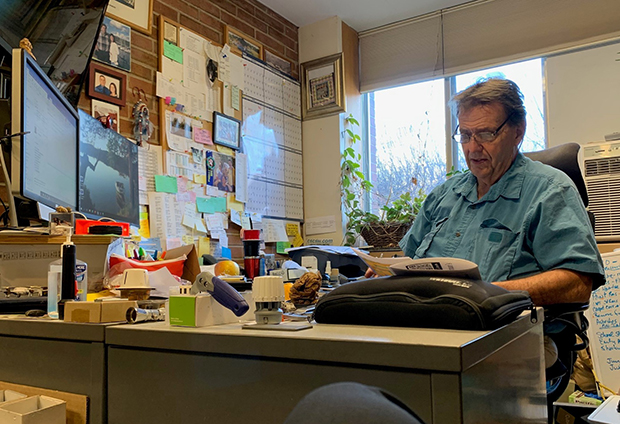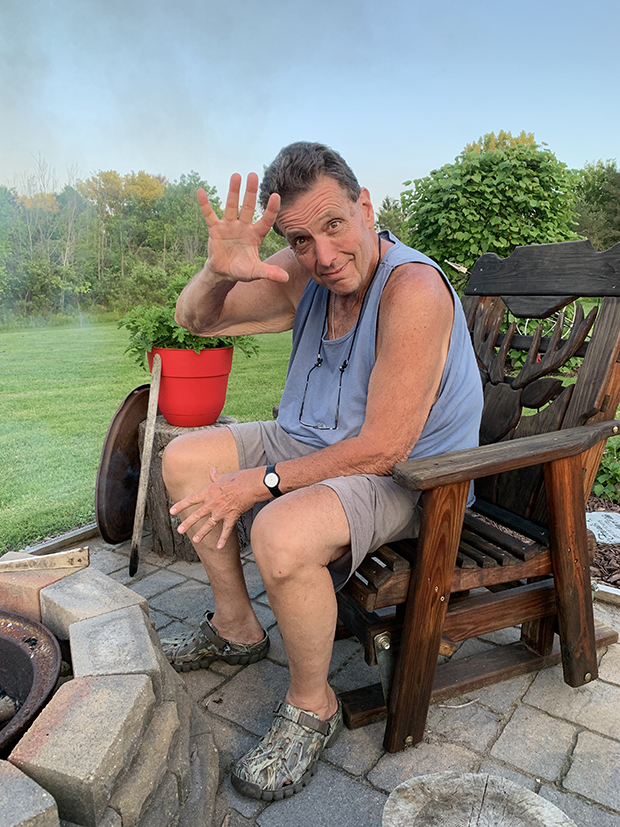Lou Farino: 50 years and he ‘never regretted a day’
After 50 years of working at Cornell, Lou Farino still wasn’t entirely sure he was ready to retire this past fall. “Things were going good!,” he said this March, only a few months into that eventual retirement. “But then came September 24, 2024 – 50 years.” Having struck a deal with his wife two years prior that he would retire after 50 full years, it was time.
“But, honey,” he pleaded.
There’s not a lot of people who’d be fighting to keep working after that kind of career, but a little insight into Lou’s leadership and work style provides some clues as to why.
“If I saw someone out in town, they’d introduce me to whoever they were with as their boss. I wouldn’t let them call me boss,” he said. “I’m not your boss. I work with you. I have my job, you have yours.
 “And eventually, after a couple more times I’d see them around, they’d say, ‘this is Lou, I work with him.’”
“And eventually, after a couple more times I’d see them around, they’d say, ‘this is Lou, I work with him.’”
And after 50 years, there’s a lot of people Lou can run into around town.
An Ithaca native and graduate of Ithaca High School, Lou came to Cornell after a brief post-high school stint with the New York state park service as a lifeguard. His first day was Sept. 24, 1974, when he joined The Cornell Store (previously the campus bookstore) as a receiving clerk – and took a pay cut.
“As a lifeguard, I was making $3.64/hour,” he said. “And I came to Cornell, and I was making $2.80/hour.”
Whatever the immediate loss, it turned out to be a solid investment in the future. He would progress through the ranks at the store – developing the store’s first true catalog, helping to set up the Cornell University Press, and remaking the store to have a more responsive and flexible sales floor at a time when physical textbooks were the core of the business.
“The campus store was a grand place to work,” he said. “Rich McDaniels – who I worked for at the time – was a visionary. He would think of something, and two years later the rest of the world was doing it.”
He spent 22 years at the store on Ho Plaza – a full career for some people and not even half of his time at Cornell. His next move was to the campus store’s new warehouse, working as a warehouse manager and eventually taking on warehousing for general stores on campus. That responsibility came with a challenge.
“We had three quarters of a million dollars in obsolete inventory,” he said. “They said, your job, Lou, is to get rid of it. Rich’s belief that was the more things we took on, it would put the campus store as the hub of all retail.”
Eventually, Lou ended up covering general stores, the print shop, digital print areas, and then, campus computing and instructional technology service, repair, and sales.
If there’s a theme to Lou’s career, it’s that this belief in his abilities on the part of his supervisors became a core tenet of his own leadership style.

“I just had a high school diploma,” he said. “And now I’m managing technology sales and a repair team of eight. I was very open with the staff. I let them tell me what they were doing and told them there’s no such thing as a bad idea or bad-mouthing other members of the staff. It worked out well.”
By June 2001, he moved to residence life, which eventually became part of campus life, as an assistant facilities manager. He started out managing Balch Hall, Risley Residential College, Mews Hall, and Court-Kay-Bauer Hall. This found him coordinating the work of 24 custodians and four maintenance mechanics. The shift in responsibilities required him to set aside some of the technology-driven work that had defined the previous years and lean on the people skills he’d developed over that time.
Later, he would find himself in charge of 1.3 million square feet of residence life facilities and around 4,000 beds. The day after move-in he’d sort through nearly 1,000 repair tickets and triage, then work with staff to address the most immediate needs first.
The units changed names: campus life to student affairs services to, eventually, Student & Campus Life. Lou’s style didn’t change.
“You don’t come here as a stuffed shirt,” he said. “I have a role I need to do. You have a role you need to do. You gain power working together and working as a team.”
And it worked. Lou ended his career as a facilities manager, with countless colleagues around campus and the area who benefitted from his honest, collaborative working style. Even now, a few months into retirement, he hasn’t lost the energy he brought to the work.
“I guess 70 is the new 50?,” said Lou, who is 72. “I feel good. Would I still be working now? Absolutely. I never regretted a day. Whether it be in the campus store days or my career here (in facilities). You make it good.”
Lou, who’s more in step with SCL’s Core Values than he might publicly admit, shared one last story.
“I had a guy who I ended up supervising. First meeting with me, he came into my office with a clipboard,” he said. “I asked him why do you have a clipboard? He said to write down notes because he’s known people to not do what they say. After two weeks, he comes in without his clipboard.
“I asked him where it was. He said, ‘I don’t need it. Because you’re a straight shooter.’”
